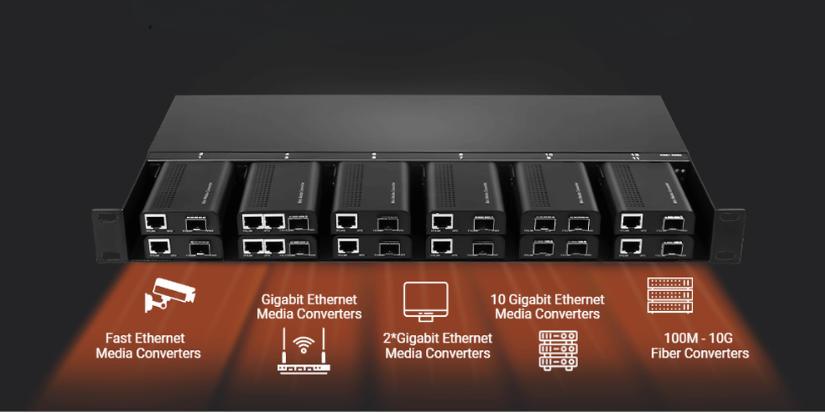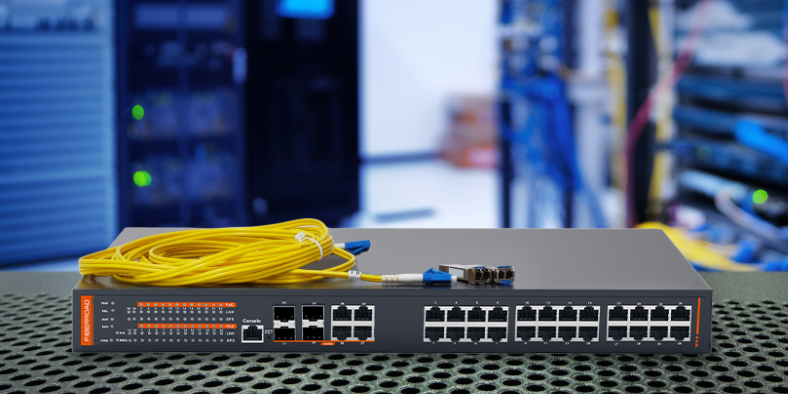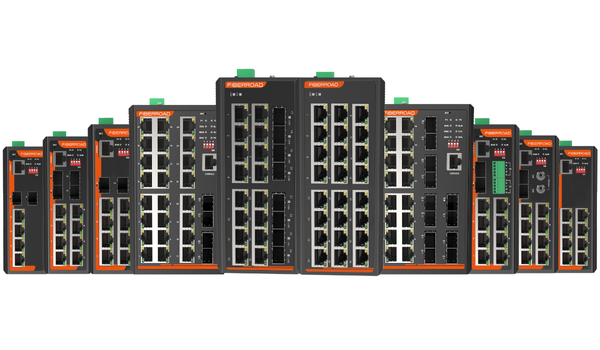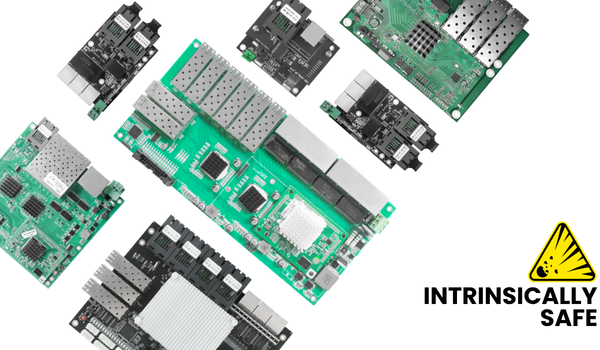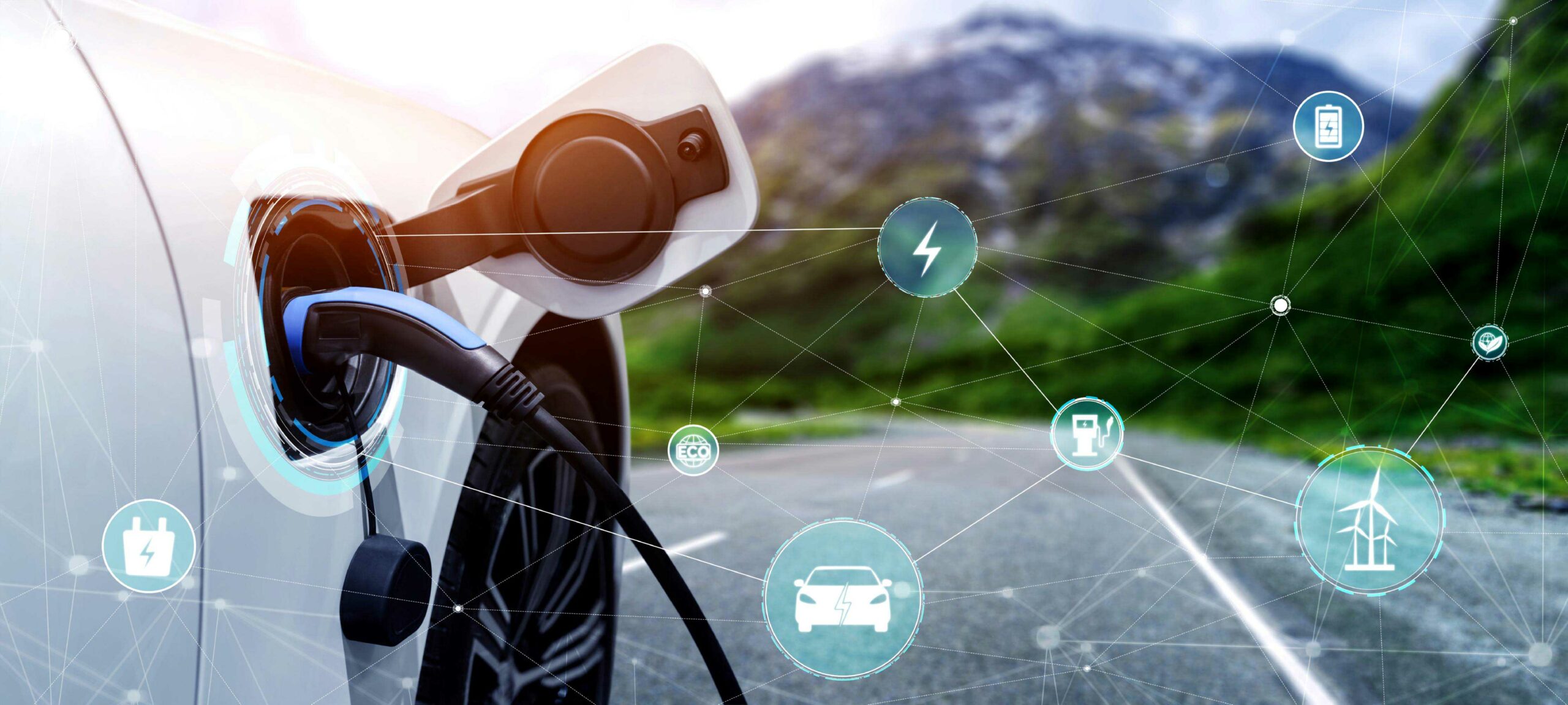
In today’s fast-paced world, technology is constantly evolving, and our beloved EVs are no exception. The rise of IIoT has opened up new possibilities for optimizing and revolutionizing the way we charge our electric vehicles. By harnessing the potential of data collection and transmission, EV charge stations are becoming smarter, more efficient, and more cost-effective than ever before.
So let’s plug in and explore how IIoT is driving change in the realm of EV charging infrastructure. Get ready to be amazed by the endless possibilities that await us with this cutting-edge technology!
The Power of IIoT in EV Charge Stations
The power of the Industrial Internet of Things (IIoT) is revolutionizing the way we charge electric vehicles (EVs). With IIoT, EV charge stations can now collect and transmit valuable data, leading to enhanced efficiency and cost-effectiveness.
By harnessing IIoT technology in EV charge stations, operators can gather real-time information on usage patterns, energy consumption, and charging rates. This data allows for better optimization of resources and planning for future demand. Additionally, IIoT enables remote monitoring of the charging process, ensuring that any issues or malfunctions are promptly identified and resolved. The power of IIoT empowers EV charge stations with actionable insights to provide a seamless charging experience for users while maximizing operational efficiency.
Data Collection: Enhancing Efficiency and Cost-effectiveness
One of the most remarkable aspects of Industrial Internet of Things (IIoT) technology is its ability to collect vast amounts of data from various sources. In the context of electric vehicle (EV) charge stations, this data collection plays a crucial role in enhancing efficiency and cost-effectiveness.
By continuously monitoring charging patterns, power consumption, and other relevant factors, charge station operators can gain valuable insights into their operations. This allows them to optimize energy usage, identify potential issues before they become major problems, and make informed decisions for better resource allocation. With real-time data at their fingertips, operators can also proactively manage any fluctuations in demand or usage patterns to ensure optimal performance and customer satisfaction. The result? Increased efficiency and cost savings for both operators and EV owners.
Data Transmission: Revolutionizing Charge Station Monitoring
Data transmission plays a crucial role in revolutionizing the monitoring of EV charge stations. With the power of IIoT, data can be seamlessly transmitted in real-time, allowing for better visibility and control over charging operations. This means that operators can remotely monitor and manage multiple charge stations from a central location, making it more efficient and convenient.
By transmitting data from charge stations to a centralized system, operators can gather valuable insights on usage patterns, energy consumption, and performance metrics. This enables them to optimize charging schedules, identify potential issues before they become major problems, and even forecast future demand. With this level of data transmission capabilities, charge station management becomes more proactive than reactive.
IIoT EV Charger Network System Requirements
For a smooth user experience, EV charging equipment should have a user-friendly interface that is easy to navigate. The process of starting and monitoring the charging should be simple, and any problems should be easily identifiable and solvable. To quickly add new charging stations, a streamlined setup process is crucial. This involves automated registration and configuration of new equipment, as well as seamless integration with existing networks. Field engineers should be able to deploy the equipment effortlessly without extensive product knowledge.
An essential aspect for EV charging solutions is remote management capability. This enables operators to centrally monitor and manage charging stations, addressing any potential issues quickly to minimize system downtime. Along with this, strong security measures must be in place to avoid unauthorized access or data breaches. Furthermore, obtaining product certification can be a lengthy process; therefore, it is crucial for EV charging equipment to meet both local and universal regulations for various vehicle models. For products intended for global distribution, obtaining pre-certification can significantly cut down on lead time.
Ultimately, the proposed system should possess strong adaptability and expandability in order to accommodate future advancements in network intricacy. This entails incorporating new charging protocols and regulations, as well as seamlessly integrating additional charging stations into the network.
System Diagram
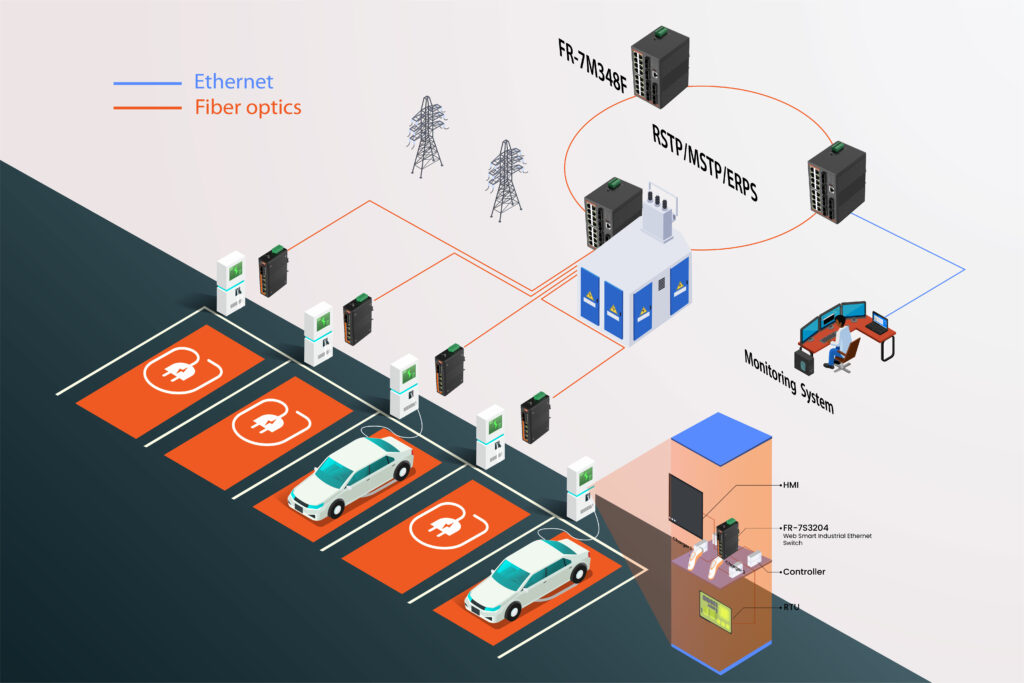
Product Recommendation
As part of EV charging network infrastructure development, Fiberroad was selected as a partner based on years of fruitful collaboration. Fiberroad provided an all-in-one solution to address legacy connection issues and bridge power gaps utilizing its FR-7S3204 Web Smart Industrial Ethernet Switch for the network access layer, and FR-7M348F Layer 2+ Managed Industrial Ethernet Switch for the edge network layer.

Web Smart Industrial Ethernet Switch

Layer 2+ Managed Industrial Ethernet Switch
Harnessing IIoT for Improved Maintenance and Management of EV Charge Stations
The advent of Industrial Internet of Things (IIoT) has revolutionized the maintenance and management of EV charge stations. With IIoT technology, operators can now remotely monitor and manage these stations, ensuring optimal performance and uptime.
By harnessing IIoT, real-time data on charging station usage, energy consumption, and equipment status can be collected. This enables proactive maintenance scheduling to prevent breakdowns or delays in service. Additionally, it allows for predictive analytics to identify potential issues before they escalate into major problems. With improved maintenance practices powered by IIoT, EV charge stations can operate efficiently while reducing downtime and costly repairs.
Related Resources

TECH NOTE
HOW OCPP IS SHAPING THE EV CHARGING LANDSCAPE
Revolutionizing the way we power our vehicles, electric vehicles (EVs) have taken centre stage in the global sustainability movement. As more and more people make the switch to EVs, it is crucial to ensure a seamless and efficient charging experience for users. This is where OCPP comes into play.

WHITE PAPER
HOW IIOT CONNECTIVITY IS REVOLUTIONIZING ELECTRIC VEHICLE CHARGING
IIoT or the Industrial Internet of Things refers to the connectivity between industrial equipment and smart devices. When applied to EV charging, IIoT connectivity allows chargers to communicate with each other and the electric grid in real-time.

MARKET RESEARCH
AMPING UP SUSTAINABILITY: A DEEP DIVE INTO EV CHARGING STATIONS
The electric vehicle (EV) charging station market has witnessed a remarkable surge in recent years, driven by the global transition towards cleaner and more sustainable transportation options.


